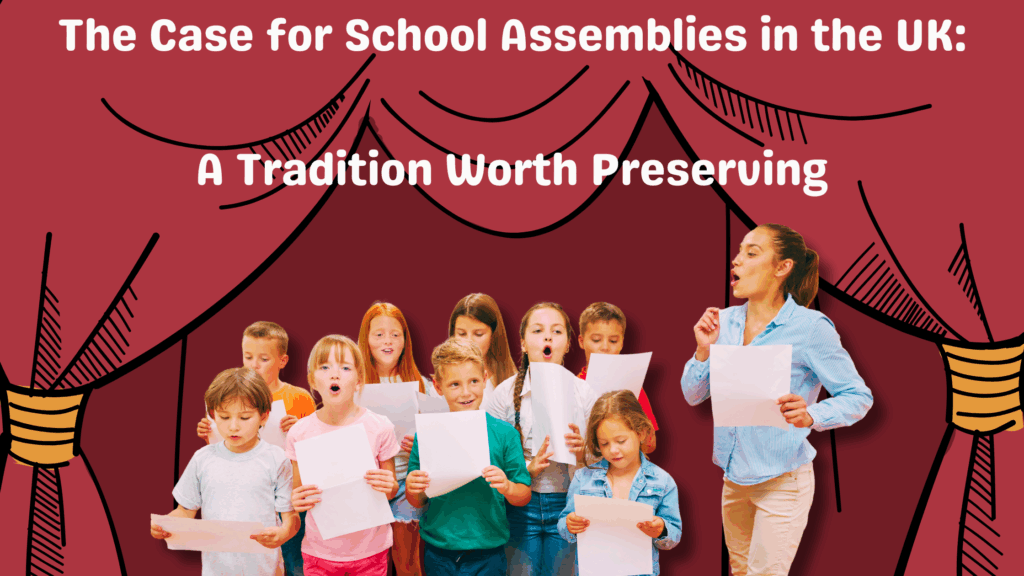School assemblies have long been a cornerstone of British education, bringing pupils together for shared moments of reflection, celebration, and community-building. However, evidence suggests that this tradition may be waning in some UK schools, particularly in light of evolving legal requirements, societal shifts, and practical constraints. Drawing on the School Standards and Framework Act 1998, insights from educational discourse on singing assemblies, and a deeper exploration of UK legislation and political debates, this article examines the potential decline of school assemblies, their significance for UK children, and the case for ensuring they remain a vibrant part of school life.
The School Standards and Framework Act 1998 provides that State schools without a religious character in England and Wales are required to provide a daily act of collective worship. This need not be at the beginning of the day and separate acts of worship may be provided for pupils in different ages or school groups.
The Act states that “the required collective worship shall be wholly or mainly of a broadly Christian character”. Collective worship is of a broadly Christian character “if it reflects the broad traditions of Christian belief without being distinctive of any particular Christian denomination”. Not every required act of collective worship needs to be of broadly Christian character, “provided that, taking any school term as a whole, most such acts which take place in the school do comply”.
In Scotland, there are no legal requirements for state schools with no religious character to hold daily acts of collective worship. The Education (Scotland) Act 1980 sets out that in all state-funded schools, the practice of ‘religious observance’ should occur at least six times a year, unless a resolution to discontinue this has been passed by the local education authority and approved by the electors in that local authority area.

The Legal Framework: Collective Worship and Assemblies
Under the School Standards and Framework Act 1998, specifically Schedule 20, all state-funded schools in England and Wales are required to provide daily acts of collective worship, which, in schools without a religious character, must be “wholly or mainly of a broadly Christian character.” This legislation mandates that assemblies occur on school premises, typically as a single act for all pupils or in separate groups based on age or year. Parents have the right to withdraw their children, and sixth-form pupils can opt out independently. In Northern Ireland, the requirement is for “un-denominational” worship, while Scotland uses terms like “Time for Reflection” to suit non-denominational contexts.
However, compliance with this law appears inconsistent. A 2022 survey cited in parliamentary debates revealed that 66% of teachers reported their schools did not hold collective worship, including 79% in non-faith schools and 11% in faith schools. Schools Week investigations noted that many schools have shifted to alternative assemblies focusing on themes like mindfulness or environmental education, reflecting a broader interpretation of “spiritual, moral, social, and cultural education.” This suggests a decline in traditional collective worship, if not assemblies altogether, as schools adapt to what they believe to be be more modern priorities and diverse pupil populations.
Have Assemblies Declined?
While hard data on the frequency of assemblies is scarce, anecdotal and survey evidence points to a decline, particularly in the traditional format of collective worship. The 1998 Act’s requirement for daily Christian-centric worship is seen by many schools, as at odds with the UK’s multicultural and secularising society. A 2019 YouGov poll found that parents ranked collective worship as the least desirable assembly activity, favouring topics like mental health, equality, and environmental issues. This shift in parental expectations, coupled with logistical challenges—such as time constraints and staffing pressures—may be reducing the frequency or altering the nature of assemblies.
The TES article highlights a specific aspect of this decline: the erosion of singing assemblies. Once a staple of school life, communal singing has diminished, with fewer schools prioritising it due to curriculum pressures and a lack of teacher confidence in leading musical activities. Yet, the article argues that singing assemblies foster emotional well-being, social cohesion, and cultural engagement, benefits that align with the broader aims of assemblies as outlined in the 1998 Act.
Political debates, such as those surrounding the Education (Assemblies) Bill introduced by Baroness Burt in 2021 and revisited in 2024, further underscore this trend. The Bill proposes replacing mandatory collective worship in non-faith schools with inclusive assemblies focused on spiritual, moral, social, and cultural education, reflecting current practices in many schools. Critics argue that the law is outdated, with Ofsted ceasing to inspect collective worship compliance two decades ago after finding three-quarters of schools non-compliant. This suggests that while assemblies may still occur, their traditional religious focus is fading, potentially reducing their prominence in school routines.
The Importance of Assemblies for UK Children
Assemblies, whether religious or secular, play a vital role in the holistic development of UK children. They provide a rare opportunity for schools to pause the academic grind and foster a sense of community, shared values, and personal reflection. Here are key reasons why assemblies remain essential:
- Social Cohesion and Community-Building: Assemblies bring pupils together, reinforcing a sense of belonging. Singing assemblies, in particular, create shared experiences that strengthen peer bonds and school identity. In a 2019 study, UNICEF UK noted that assemblies focusing on children’s rights helped foster a “rights-respecting ethos,” encouraging empathy and mutual respect.
- Spiritual, Moral, Social, and Cultural Development: The 1998 Act underscores the role of assemblies in promoting pupils’ spiritual and moral growth. Modern assemblies often cover topics like equality, mental health, and global citizenship, which a 2019 YouGov poll showed parents value highly. These sessions help children navigate complex ethical issues and develop a broader worldview.
- Emotional Well-Being: Singing assemblies are a tool for emotional regulation, noting that music can reduce stress and boost mood. Assemblies also provide space for reflection, as seen in SPCK’s “Pause for Thought” series, which addresses issues like loneliness and hope, particularly during crises like the COVID-19 pandemic.
- Cultural and Historical Connection: Assemblies often mark significant cultural or historical events, such as Remembrance Day, helping children understand shared heritage. The parliamentary debate on the Education (Assemblies) Bill emphasised the importance of maintaining a “common core” of values, such as Judeo-Christian principles, to ground children in societal norms. Singing assemblies, as TES notes, preserve cultural traditions through folk songs and hymns.
- Pupil Voice and Participation: Assemblies can amplify pupil voice, aligning with the UK’s push for “pupil participation” since the 2002 Education Act. School councils often use assemblies to share initiatives, fostering leadership and democratic engagement. However, research suggests that without genuine power, such participation can feel tokenistic, highlighting the need for meaningful assembly content.
The Case for Reviving and Reimagining Assemblies
To ensure assemblies remain a fixture in UK schools, policymakers, educators, and communities must address the challenges driving their decline.
Teacher training and resources are critical. The TES article suggests that many teachers lack confidence in leading singing assemblies, a gap that could extend to other assembly formats. Organisations like SPCK and Assemblies for All provide free, high-quality resources, but schools need support to integrate these effectively. Professional development could equip teachers to deliver engaging assemblies, whether through music, storytelling, or interactive discussions.
Assemblies should reflect pupil and parental priorities. The 2019 YouGov poll’s emphasis on topics like mental health and equality suggests that assemblies must evolve to stay relevant. Involving pupils in planning assemblies, as advocated by the pupil participation movement, could enhance engagement and ensure content reflects their lives. Linking Historical context and morals that are taught within religious context in a broader spectrum helps with engendering better resilience and character among children.
Finally, the emotional and social benefits of assemblies, particularly singing, warrant greater recognition. Research showing that communal singing boosts oxytocin levels, fostering trust and connection. In an era of rising mental health challenges among UK youth, assemblies offer a low-cost, scalable way to support well-being.
Conclusion
School assemblies in the UK, while rooted in the legal mandate for collective worship, are at a crossroads. Evidence of their decline, driven by school-led, societal shifts, and practical constraints, raises concerns about losing a tradition that fosters community, reflection, and well-being. For UK children, assemblies provide invaluable opportunities to develop socially, morally, and emotionally, as highlighted by the enduring appeal of singing assemblies and the broader goals of the 1998 Act. Investing in teacher support, and prioritising inclusive, pupil-centred content, schools can ensure assemblies remain a vital part of education. In a fast-paced, fragmented world, the simple act of gathering to sing, reflect, or celebrate together is a tradition worth preserving for generations to come.
References
- School Standards and Framework Act 1998 https://www.legislation.gov.uk/ukpga/1998/31/contents
- School Standards and Framework Act 1998 Section 144 https://www.legislation.gov.uk/ukpga/1998/31/section/144
- School Standards and Framework Act 1998 Section 70 https://www.legislation.gov.uk/ukpga/1998/31/section/70
- TES Why schools should bring back singing in assembly https://www.tes.com/magazine/archive/why-schools-should-bring-back-singing-assembly
- The School Governance (Roles, Procedures and Allowances) (England) Regulations 2013 https://www.legislation.gov.uk/uksi/2013/1624/part/4
- Hansard Education Bill https://hansard.parliament.uk/Lords/2025-02-07/debates/FA67E4EC-8C15-479E-A5EA-802C6FE512AE/Education(Assemblies)Bill(HL)
- Assemblies For All https://assembliesforall.org.uk/about/faqs/
- Guide to the law on assemblies https://assembliesforall.org.uk/about/law-on-assemblies/
- Law & Religion UK Why the Education (Assemblies) Bill should become law https://lawandreligionuk.com/2021/12/07/why-the-education-assemblies-bill-should-become-law/
- Education Act 1996 https://www.legislation.gov.uk/ukpga/1996/56/part/V/chapter/IV/crossheading/politics
- Education Act 2002 https://www.legislation.gov.uk/ukpga/2002/32/contents
- Society for Promoting Christian Knowledge (SPCK) – Assemblies: https://spckpublishing.co.uk/assemblies
- History & Policy Should school students get a say? Why fifty years of ‘pupil participation’ hasn’t changed the UK education system – and what we might do differently https://historyandpolicy.org/policy-papers/papers/should-school-students-get-a-say-why-fifty-years-of-pupil-participation-hasnt-changed-the-uk-education-system-and-what-we-might-do-differently/
- Parliament.UK APPENDIX 48 Memorandum from the Independent Schools Council https://publications.parliament.uk/pa/cm199899/cmselect/cmeduemp/509/509ap54.htm
- Church Times – Liberal Democrat Bill to scrap school assemblies returns to the House of Lords https://www.churchtimes.co.uk/articles/2024/20-september/news/uk/liberal-democrat-bill-to-scrap-school-assemblies-returns-to-the-house-of-lords
- Education Act 2011 https://www.legislation.gov.uk/ukpga/2011/21/contents
- Darlington Borough Council The case for non-religious, fully inclusive assemblies in UK schools https://democracy.darlington.gov.uk/documents/s19383/Item%204%20Inclusive%20assemblies%20and%20collective%20worship%20WSCC%20SACRE%20November%202022%20updated.pdf
- UNICEF Primary school assembly plans https://www.unicef.org.uk/rights-respecting-schools/resources/teaching-resources/guidance-assemblies-lessons/primary-school-assemblies/
- Northern Ireland Assembly Report on the Education Bill (volume 3) https://www.niassembly.gov.uk/assembly-business/committees/2016-2017/education/archive/2007—2011-mandate/archive-committee-reports/session-2008—2009/report-on-the-education-bill-volume-3/
- The Royal Society The ice-breaker effect: singing mediates fast social bonding https://royalsocietypublishing.org/doi/10.1098/rsos.150221#d6800127e1
